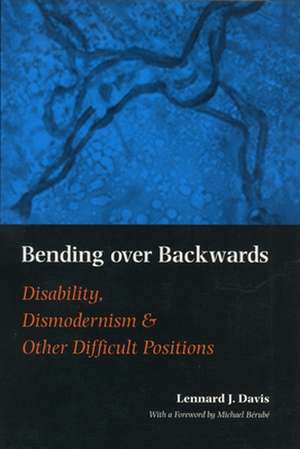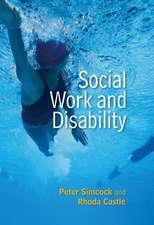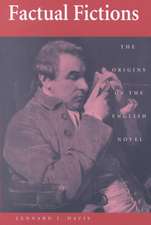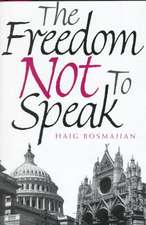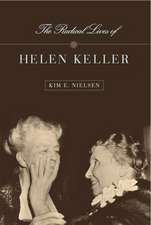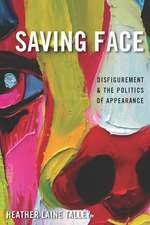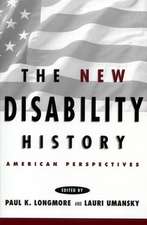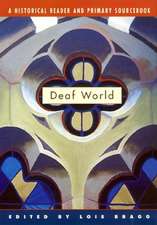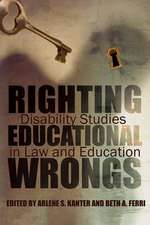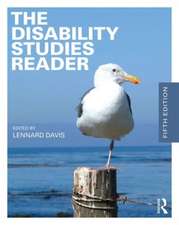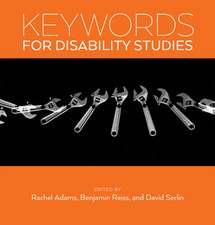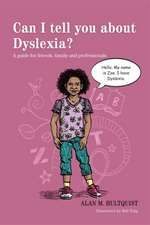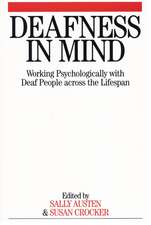Bending Over Backwards – Essays on Disability and the Body: Cultural Front
Autor Lennard J. Davis, Michael Bérubéen Limba Engleză Paperback – 31 aug 2002
| Toate formatele și edițiile | Preț | Express |
|---|---|---|
| Paperback (1) | 208.96 lei 6-8 săpt. | |
| MI – New York University – 31 aug 2002 | 208.96 lei 6-8 săpt. | |
| Hardback (1) | 523.64 lei 6-8 săpt. | |
| MI – New York University – 31 aug 2002 | 523.64 lei 6-8 săpt. |
Preț: 208.96 lei
Nou
Puncte Express: 313
Preț estimativ în valută:
39.99€ • 43.42$ • 33.59£
39.99€ • 43.42$ • 33.59£
Carte tipărită la comandă
Livrare economică 22 aprilie-06 mai
Preluare comenzi: 021 569.72.76
Specificații
ISBN-13: 9780814719503
ISBN-10: 0814719503
Pagini: 200
Dimensiuni: 152 x 228 x 12 mm
Greutate: 0.3 kg
Ediția:New.
Editura: MI – New York University
Seria Cultural Front
ISBN-10: 0814719503
Pagini: 200
Dimensiuni: 152 x 228 x 12 mm
Greutate: 0.3 kg
Ediția:New.
Editura: MI – New York University
Seria Cultural Front
Recenzii
"Bending Over Backwards is a welcome dismemberment of all that was unknowingly artificial from the start."
The Minnesota Review [Its] uniqueness of thought is this collections strength as it makes for an interesting and proactive read.
American Journal of Occupational Therapy "Davis's work offers creative and challenging examples that may be useful to our discipline and particularly to Disability historians. Bending Over Backwards remains an important and useful work for historians as a template for examining the myriad ways disability and Deafness infiltrate vital aspects of our identity, including laws, cultural icons, literature, and citizenship."
H-Net Reviews "Taken all together, the chapters offer an important, theoretically rich introduction to disability issues."
Novel "It is crucial, if at times uncomfortable, reading for medical professionals and scholars in the medical humanities alike. . . . Daring to mix the literary and the medical, the symbolic and the instrumental, the interpretive and the interventionist, Davis demonstrates what disability can teach us about the life that awaits any human baby."
Literature and Medicine "This superlative book is highly recommended for undergraduates, scholars, and researchers in the fields of disability studies, sociology, psychology, anthropology, ethics, and cultural studies."Choice "Lennard Davis is history in the making; for he is one of the foremost proponents of "disability studies," the newest theoretical kid on the block, noteworthy in part because it brings together scholars from the humanities and the medical sciences."
Stanley Fish, in Chicago Tribune A collection of essays written over several years for different audiences, it contains fascinating traces of Daviss intellectual journey from novel theorist and Foucauldian to disability studeis scholar and memoirist.
American Literature
"Bending Over Backwards is a welcome dismemberment of all that was unknowingly artificial from the start." --The Minnesota Review "[Its] uniqueness of thought is this collection's strength as it makes for an interesting and proactive read." --American Journal of Occupational Therapy "Davis's work offers creative and challenging examples that may be useful to our discipline and particularly to Disability historians. Bending Over Backwards remains an important and useful work for historians as a template for examining the myriad ways disability and Deafness infiltrate vital aspects of our identity, including laws, cultural icons, literature, and citizenship." --H-Net Reviews "Taken all together, the chapters offer an important, theoretically rich introduction to disability issues." --Novel "It is crucial, if at times uncomfortable, reading for medical professionals and scholars in the medical humanities alike... Daring to mix the literary and the medical, the symbolic and the instrumental, the interpretive and the interventionist, Davis demonstrates what disability can teach us about the life that awaits any human baby." --Literature and Medicine "This superlative book is highly recommended for undergraduates, scholars, and researchers in the fields of disability studies, sociology, psychology, anthropology, ethics, and cultural studies."--Choice "Lennard Davis is history in the making; for he is one of the foremost proponents of "disability studies," the newest theoretical kid on the block, noteworthy in part because it brings together scholars from the humanities and the medical sciences." --Stanley Fish, in Chicago Tribune "A collection of essays written over several years for different audiences, it contains fascinating traces of Davis's intellectual journey from novel theorist and Foucauldian to disability studeis scholar and memoirist." --American Literature
The Minnesota Review [Its] uniqueness of thought is this collections strength as it makes for an interesting and proactive read.
American Journal of Occupational Therapy "Davis's work offers creative and challenging examples that may be useful to our discipline and particularly to Disability historians. Bending Over Backwards remains an important and useful work for historians as a template for examining the myriad ways disability and Deafness infiltrate vital aspects of our identity, including laws, cultural icons, literature, and citizenship."
H-Net Reviews "Taken all together, the chapters offer an important, theoretically rich introduction to disability issues."
Novel "It is crucial, if at times uncomfortable, reading for medical professionals and scholars in the medical humanities alike. . . . Daring to mix the literary and the medical, the symbolic and the instrumental, the interpretive and the interventionist, Davis demonstrates what disability can teach us about the life that awaits any human baby."
Literature and Medicine "This superlative book is highly recommended for undergraduates, scholars, and researchers in the fields of disability studies, sociology, psychology, anthropology, ethics, and cultural studies."Choice "Lennard Davis is history in the making; for he is one of the foremost proponents of "disability studies," the newest theoretical kid on the block, noteworthy in part because it brings together scholars from the humanities and the medical sciences."
Stanley Fish, in Chicago Tribune A collection of essays written over several years for different audiences, it contains fascinating traces of Daviss intellectual journey from novel theorist and Foucauldian to disability studeis scholar and memoirist.
American Literature
"Bending Over Backwards is a welcome dismemberment of all that was unknowingly artificial from the start." --The Minnesota Review "[Its] uniqueness of thought is this collection's strength as it makes for an interesting and proactive read." --American Journal of Occupational Therapy "Davis's work offers creative and challenging examples that may be useful to our discipline and particularly to Disability historians. Bending Over Backwards remains an important and useful work for historians as a template for examining the myriad ways disability and Deafness infiltrate vital aspects of our identity, including laws, cultural icons, literature, and citizenship." --H-Net Reviews "Taken all together, the chapters offer an important, theoretically rich introduction to disability issues." --Novel "It is crucial, if at times uncomfortable, reading for medical professionals and scholars in the medical humanities alike... Daring to mix the literary and the medical, the symbolic and the instrumental, the interpretive and the interventionist, Davis demonstrates what disability can teach us about the life that awaits any human baby." --Literature and Medicine "This superlative book is highly recommended for undergraduates, scholars, and researchers in the fields of disability studies, sociology, psychology, anthropology, ethics, and cultural studies."--Choice "Lennard Davis is history in the making; for he is one of the foremost proponents of "disability studies," the newest theoretical kid on the block, noteworthy in part because it brings together scholars from the humanities and the medical sciences." --Stanley Fish, in Chicago Tribune "A collection of essays written over several years for different audiences, it contains fascinating traces of Davis's intellectual journey from novel theorist and Foucauldian to disability studeis scholar and memoirist." --American Literature
